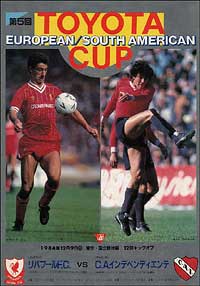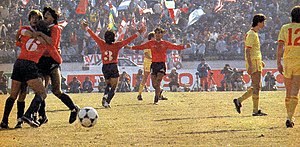1984 Intercontinental Cup
 Match programme cover | |||||||
| |||||||
| Date | 9 December 1984 | ||||||
|---|---|---|---|---|---|---|---|
| Venue | José Percudani (Independiente)[1] | ||||||
| Referee | Romualdo Arppi Filho (Brazil) | ||||||
| Attendance | 62,000 | ||||||
The 1984 Intercontinental Cup was an
The teams had qualified for the competition by winning their continent's primary cup competition. Independiente qualified by winning the primary South American cup competition, the
Watched by a crowd of 62,000, Independiente took the lead in the sixth minute when
Background

Independiente qualified for the Intercontinental Cup as the reigning Copa Libertadores winners. They won the
Liverpool had qualified for the Intercontinental Cup as a result of winning the
Liverpool's last match before the Intercontinental cup was against
Match
Summary

Before the match, Liverpool lost defender

Following the goal, Independiente under instruction from their manager
Despite being the better team for the majority of the match, Liverpool were unable to beat the Independiente defence, with their shooting in front of goal being the culprit. Both sides questioned some of the referee's decisions. Liverpool believed they should have had two penalties, while Independiente felt that the assistant referee's decisions were questionable. Incidentally, the referee had served half of his two match ban handed out by the Brazilian Football Association.[5]
Details
| Liverpool | 0–1 | |
|---|---|---|
| Report | Percudani |
Liverpool
|
Independiente
|
|
| |||||||||||||||||||||||||||||||||||||||||||||||||||||||||||||||||||||||||||||||||||||||||||||||||||||||||||||||||||||||||||||||||||
|
Man of the Match:
|
Post-match

Despite the defeat, Liverpool manager Joe Fagan could not fault the effort his players had put in: "Independiente are a good defensive tactical team and we could find no way through, the weather was ideal, we were just as fit as they were. The South Americans have better ball control than we do. We were disappointed with the result but I wasn't disappointed with the display."[5]
Liverpool finished the
Independiente would finish their season in the Primera Division in 14th place.[4] Despite this, they competed in the 1985 Copa Libertadores as the reigning champions. However, they were unable to retain their title as they exited in the semi-finals.[12]
See also
- 1983–84 European Cup
- 1984 Copa Libertadores
- Liverpool F.C. in European football
References
- ^ a b Lene de Arruda, Marceloi (2 January 2009). "Toyota Cup – Most Valuable Player of the Match Award". Rec. Sport. Soccer. Statistics. Foundation. Archived from the original on 3 June 2009. Retrieved 23 December 2009.
- ^ a b Stokkermans, Karel; Magnani, Loris (30 April 2005). "Intercontinental Club Cup". Rec.Sport.Soccer Statistics Foundation (RSSSF). Retrieved 15 December 2011.
- ^ "Liverpool 3–1 Coventry City". LFC History. Retrieved 3 June 2015.
- ^ a b Ciullini, Pablo (20 March 2009). "Argentina 1984". Rec. Sport. Soccer. Statistics. Foundation. Archived from the original on 19 July 2015. Retrieved 3 June 2015.
- ^ a b c Harrison, Gerry (10 December 1984). "Liverpool fail to bridge the gulf on the field". The Times. London.
- ^ a b c Ginnell, Luke (4 November 2014). "The elusive trophy: thirty years on, how Liverpool's greatest team failed to rule the world". FourFourTwo. Retrieved 3 June 2015.
- ^ "1984: Independiente deny Liverpool". Union of European Football Associations (UEFA). 9 December 1984. Archived from the original on 12 January 2016. Retrieved 15 December 2011.
- ^ "Toyota Cup 1984". FIFA. Archived from the original on 6 March 2008. Retrieved 4 June 2015.
- ^ Felton, Paul. "Season 1984–85". Rec. Sport. Soccer. Statistics. Foundation. Retrieved 3 June 2015.
- ^ Hale & Ponting (1992, p. 189)
- ^ Hutchings & Nawrat (1995, p. 251)
- ^ Ciullini, Pablo; Stokkermans, Karel (29 November 2012). "Copa Libertadores de América". Rec. Sport. Soccer. Statistics. Foundation. Retrieved 3 June 2015.
Bibliography
- Hale, Steve; Ponting, Ivan (1992). Liverpool In Europe. London: Guinness Publishing. ISBN 0-85112-569-7.
- Hutchings, Steve; Nawrat, Chris (1995). The Sunday Times Illustrated History of Football: The Post-War Years. London: Chancellor Press. ISBN 1-85153-014-2.
External links
- FIFA Article Archived
- Match Report at LFC History
